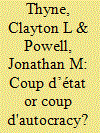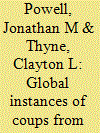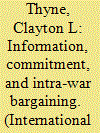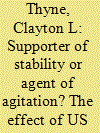|
|
|
Sort Order |
|
|
|
Items / Page
|
|
|
|
|
|
|
| Srl | Item |
| 1 |
ID:
145103


|
|
|
|
|
| Summary/Abstract |
This paper considers how coups impact democratization. Current research focuses on coups as a threat to consolidated and fledgling democracies. Policymakers have adapted to this viewpoint by treating coups as unjustifiable maneuvers that must be curtailed, with states frequently terminating aid and IOs suspending membership following a coup. While coups clearly confound democratic consolidation, it is notable that the vast majority of coups do not happen in democracies. Therefore, we focus on authoritarian regimes in seeking to discover how coups might open paths toward democratization. We first argue that successful coups should promote democratization because leaders have incentives to democratize quickly in order to establish political legitimacy and economic growth. Second, we view failed coups as credible signals that leaders must enact meaningful reforms to remain in power. Empirical analyses strongly support the argument that coups promote democratization, particularly among states that are least likely to democratize otherwise.
|
|
|
|
|
|
|
|
|
|
|
|
|
|
|
|
| 2 |
ID:
103724


|
|
|
|
|
| Publication |
2011.
|
| Summary/Abstract |
Once considered a 'hot topic' among scholars, research on coups d'état has waned in recent years. This decline is surprising given that 7 coups have happened between January 2008 and December 2010, bringing the last decade's total to almost three dozen. One explanation for the lack of coup research is the absence of a temporally and spatially comprehensive dataset to test theories. Also absent is a discussion of what makes coups distinct from other forms of anti-regime activity. This article seeks to remedy these problems. The authors present a new dataset on coups from 1950 to 2010. They begin by explaining their theoretical definition and coding procedures. Next, they examine general trends in the data across time and space. The authors conclude by explaining why scholars studying a variety of topics, including civil wars, regime stability, and democratization, would benefit by paying closer attention to coups.
|
|
|
|
|
|
|
|
|
|
|
|
|
|
|
|
| 3 |
ID:
117522


|
|
|
|
|
| Publication |
2012.
|
| Summary/Abstract |
This article considers how governmental variations affect the duration of civil conflicts. Recent work suggests that war termination is likely when competing actors gain information about the power balance and are able to credibly commit to war-ending agreements. I focus on how the strength and stability of executives impact these factors. Regarding information, power consolidation within the government reduces the number of people who must agree on a settlement, which should shorten civil conflicts. Stable leadership should likewise shorten conflicts by making it harder for potential spoilers to derail war-ending agreements, helping minimize credibility problems. This argument is tested by examining how variations in institutional design (executive constitutional and legislative power), political strength (ideological fragmentation and polarization), and stability (leadership tenure) affect the duration of civil conflicts from 1946 to 2004. The results suggest that powerful and stable executives are indeed well equipped to end civil conflicts.
|
|
|
|
|
|
|
|
|
|
|
|
|
|
|
|
| 4 |
ID:
109581


|
|
|
|
|
| Publication |
2011.
|
| Summary/Abstract |
We develop and test a theory of the supply side of third-party conflict management. Building on Kydd's (2003) model of mediation, which shows that bias enhances mediator credibility, we offer three complementary mechanisms that may enable mediator credibility. First, democratic mediators face costs for deception in the conflict management process. Second, a vibrant global democratic community supports the norms of unbiased and nonviolent conflict management, again increasing the costs of deception for potential mediators. Third, as disputants' ties to international organizations increase, the mediator's costs for dishonesty in the conflict management process rise because these institutions provide more frequent and accurate information about the disputants' capabilities and resolve. These factors, along with sources of bias, increase the availability of credible mediators and their efforts to manage interstate conflicts. Empirical analyses of data on contentious issues from 1816 to 2001 lend mixed support for our arguments. Third-party conflict management occurs more frequently and is more successful if a potential mediator is a democracy, as the average global democracy level increases, and as the disputants' number of shared International Organization (IO) memberships rises. We also find that powerful states serve as mediators more often and are typically successful. Other factors such as trade ties, alliances, issue salience, and distance influence decisions to mediate and mediation success. Taken together, our study provides evidence in support of Kydd's bias argument while offering several mechanisms for unbiased mediators to become credible and successful mediators.
|
|
|
|
|
|
|
|
|
|
|
|
|
|
|
|
| 5 |
ID:
098414


|
|
|
|
|
| Publication |
2010.
|
| Summary/Abstract |
This article takes a two-step approach to improving our understanding of how US foreign policy signals affect the likelihood of coups in Latin America. First, a large body of qualitative literature has developed a 'conventional wisdom' on this subject, suggesting that pressure from the USA plays a key role in stabilizing favored leaders and destabilizing unfavored leaders. Meanwhile, quantitative scholarship analyzing coups focuses almost exclusively on intrastate factors. The first step brings these two bodies of work together by providing quantitative evidence that hostile US signals increase the likelihood of coups, while supportive signals have a stabilizing effect. The second step moves beyond the conventional wisdom by (1) reconsidering theoretical assumptions within the conventional argument and (2) identifying anomalies within the preliminary empirical analyses. These efforts reveal several factors that are likely to impact how coup plotters respond to US signals. Among these factors, empirical analyses indicate that US signals are particularly important when economic dependence on the USA increases, during the middle of a US president's term in office, when they have moderate levels of consistency, and when they specifically mention the military. Overall, the first stage of this article provides a robust confirmation of the conventional wisdom, while the second stage moves the literature down a path that is largely unexplored by previous work.
|
|
|
|
|
|
|
|
|
|
|
|
|
|
|
|
| 6 |
ID:
146150


|
|
|
|
|
| Summary/Abstract |
Successful management of combatants through disarmament, demobilization, and reintegration (DDR) remains one of the main challenges of post-conflict peacebuilding. While DDR is meant to contribute to a secure post-conflict environment conducive to economic and political development, the success of DDR efforts remains mixed. Unlike previous work focusing on procedural aspects or post-conflict reconstruction and development, we shift the focus to understand microlevel conditions—economic, security, and ethnic concerns—that influence ex-combatants' satisfaction with DDR. We argue that ex-combatant satisfaction with DDR should increase as individual-level economic conditions increase, as security situations improve, and as ethnic tensions decrease. We test our expectations using an original data set collected with field interviews and surveys from 122 ex-combatants in South Sudan in 2011–2012. We find that participants are more satisfied when their income-generating activity is based on DDR job training and when the UN has a large presence in their area. Concerns about political instability and an abundance of firearms make ex-combatants less satisfied with DDR.
|
|
|
|
|
|
|
|
|
|
|
|
|
|
|
|
|
|
|
|
|